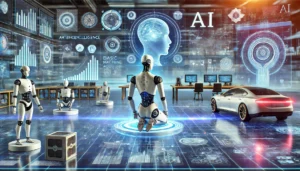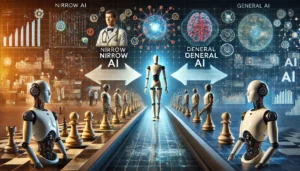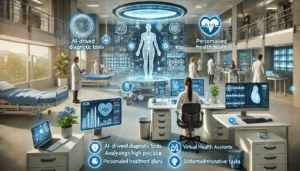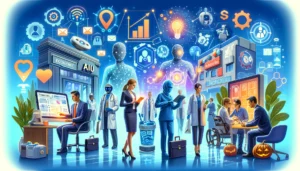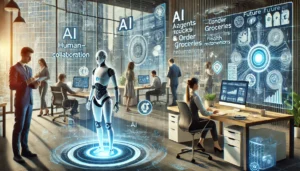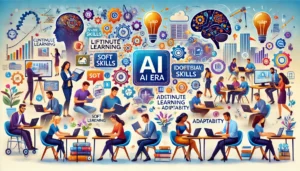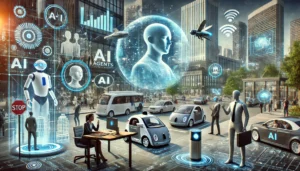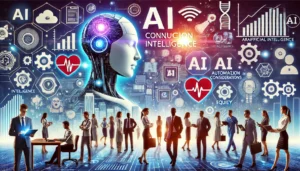The Future of AI: How Intelligent Agents are Transforming Our World

Artificial intelligence (AI) is a branch of computer science that deals with the creation of intelligent agents, which are systems that can reason, learn, and act autonomously. In simpler terms, it’s about making machines mimic human cognitive functions like problem-solving and decision-making. AI encompasses a wide range of technologies, from basic algorithms to complex machine learning systems that can analyse massive amounts of data and make predictions. These technologies are already being used in many aspects of our daily lives, from the recommendation systems on streaming services to the self-driving cars being developed by tech giants.
Key Takeaways
- AI agents are transforming various industries, including healthcare, finance, and education, by enhancing efficiency and innovation.
- The evolution from narrow AI to general AI is paving the way for more intelligent and autonomous systems capable of complex decision-making.
- Ethical and privacy concerns remain significant challenges in the integration of AI agents into society.
- Human-AI collaboration is expected to enhance productivity and create new opportunities for innovation.
- Preparing for an AI-driven future requires adapting skills, education, and regulatory frameworks to keep pace with technological advancements.
The Evolution of AI Agent Technology
Historical Milestones in AI Development
The trail towards advanced AI agents has been long and winding, with progress often stalling due to limitations in computing power and algorithm capabilities. The seminal idea of intelligent agents emerged in the 1950s when pioneers like John McCarthy, Marvin Minsky, and Claude Shannon recognised the potential for machines to perceive, reason, and act. These early visions laid the groundwork for the sophisticated AI agents we see today.
Key Innovations Driving AI Agents
Several key innovations have driven the development of AI agents over the decades. The advent of machine learning algorithms, the rise of big data, and advancements in neural networks have all played crucial roles. Additionally, the development of natural language processing (NLP) has enabled AI agents to understand and interact with humans more effectively. Reinforcement learning has also been a game-changer, allowing agents to learn from their environments and improve their performance over time.
The Shift from Narrow to General AI
Initially, AI agents were designed for narrow, specific tasks, such as playing chess or diagnosing diseases. However, there has been a significant shift towards developing general AI, which aims to perform any intellectual task that a human can do. This transition is marked by the creation of more versatile and adaptive agents capable of learning and reasoning across various domains. The journey from narrow to general AI is ongoing, but the progress made so far is promising.
The evolution of AI agent technology is a testament to human ingenuity and the relentless pursuit of innovation. As we continue to push the boundaries, the potential for AI agents to transform our world becomes increasingly evident.
How AI Agents Work: Demystifying the Technology
AI agents are given a goal by their creator and then left to figure out how to achieve it independently using algorithms and other capabilities. These capabilities allow them to understand natural language, access knowledge bases, and exhibit a degree of autonomy. The scope and fidelity of the goal determine how useful the agent can be. More open-ended goals require more advanced agents.
Core Components of Artificial Intelligence Agents
Under the hood, these intelligent software entities operate in a fascinating perception, action, and learning cycle. Buckle up as we delve into the world of AI agents and explore their inner workings, the different types, the applications revolutionising industries, and the exciting possibilities they hold for the future.
Machine Learning and Data Processing
The advent of AI Agents signifies a paradigm shift in artificial intelligence, transcending mere data processing to encompass higher-order intelligent decision-making and task execution. These agents not only execute predefined tasks but also learn and adapt within unknown environments, laying the groundwork for the intelligent societies of the future.
Autonomous Decision-Making
AI Agents, also referred to as intelligent agents, represent sophisticated systems capable of autonomously perceiving their surroundings, making decisions, and executing tasks. Unlike conventional software programs, AI Agents possess higher levels of autonomy and intelligence, enabling them to adapt and optimise their actions in response to changes in their environment.
AI Agent Applications Across Various Industries
Transforming Healthcare with AI Agents
AI agents are revolutionising healthcare by enhancing diagnostic accuracy, personalising treatment plans, and streamlining administrative tasks. AI-driven diagnostic tools can analyse medical images with remarkable precision, often surpassing human capabilities. Virtual health assistants provide patients with 24/7 support, answering queries and managing appointments. These advancements not only improve patient outcomes but also reduce the burden on healthcare professionals.
Revolutionising Finance and Banking
In the finance sector, AI agents are optimising operations, enhancing security, and providing personalised financial advice. Predictive analytics powered by AI can forecast market trends, enabling better investment decisions. AI-driven chatbots and virtual assistants offer customers real-time support, while advanced algorithms detect fraudulent activities with high accuracy. The integration of AI in finance is not just about efficiency; it’s about creating a more secure and user-friendly financial ecosystem.
Enhancing Education and Learning
AI agents are transforming education by offering personalised learning experiences and automating administrative tasks. Intelligent tutoring systems adapt to individual student needs, providing customised feedback and resources. AI-driven analytics help educators identify learning gaps and tailor their teaching strategies accordingly. This personalised approach not only enhances student engagement but also improves learning outcomes.
The integration of AI agents across various industries is not just a technological advancement; it’s a paradigm shift that is reshaping how we live and work.
Google ads PPC and Other Marketing Applications
AI agents are also making significant strides in the marketing industry. Google ads PPC and Google Adwords PPC campaigns are becoming more efficient through AI-driven analytics and automation. A PPC agency or a London PPC agency can leverage AI to optimise ad spend, target the right audience, and improve conversion rates. Google ads agencies and PPC management firms are increasingly using AI to conduct comprehensive Google ads audits and PPC audits, ensuring that campaigns are running at peak efficiency. Whether it’s a PPC ad agency, Google advertising agencies, or a PPC eCommerce agency, the use of AI in eCommerce PPC is transforming how businesses reach and engage with their customers.
Opportunities and Challenges in AI Agent Integration
Economic and Social Benefits
AI agents offer transformative potential across various sectors, driving efficiency and innovation. Businesses can leverage AI to enhance customer experiences, streamline operations, and reduce costs. In healthcare, AI agents assist in diagnostics and personalised treatment plans, while in finance, they enable real-time fraud detection and risk management. The social benefits include improved accessibility to services and the democratisation of knowledge.
Ethical and Privacy Concerns
The increasing sophistication of AI agents raises significant ethical and privacy issues. Bias in training data can lead to unfair outcomes, and the lack of transparency in AI decision-making processes can erode trust. It’s crucial to establish robust ethical frameworks and ensure that AI behaviour aligns with human values. Privacy concerns also need to be addressed, particularly regarding data collection and usage.
Overcoming Technical Hurdles
Integrating AI agents into existing systems presents several technical challenges. These include ensuring interoperability, maintaining data quality, and achieving real-time processing capabilities. Additionally, the development of explainable AI is essential to foster trust and accountability. Overcoming these hurdles requires continuous innovation and collaboration between technologists, policymakers, and industry leaders.
The emergence of AI agents brings both opportunities and challenges that must be navigated carefully to ensure responsible and beneficial integration into society.
The Future of Human-AI Collaboration
As we gear up to embrace the future of AI interactions, it’s worth noting how these advancements will elevate the scope of human-computer interaction. Tasks that were once thought to require human touch and intuition might soon be efficiently handled by AI agents, thus creating a future where technology truly becomes a seamless extension of our lives.
AI agents are set to revolutionise the workplace by taking over routine tasks, allowing humans to focus on more complex and creative aspects of their roles. This shift will not only enhance productivity but also foster a more innovative and fulfilling work environment.
The integration of AI agents into daily life is already underway, and it’s only going to become more prevalent. From personalised virtual assistants to smart home devices, AI agents are making everyday tasks easier and more efficient. Imagine a world where your AI assistant can manage your schedule, order groceries, and even provide personalised recommendations for your health and wellness. This level of integration will make AI an indispensable part of our daily routines.
The future of human-AI collaboration lies in developing symbiotic relationships where both humans and AI agents complement each other’s strengths. This involves creating AI systems that are not only intelligent but also empathetic and capable of understanding human emotions and needs. By fostering such relationships, we can ensure that AI agents enhance our lives without overshadowing the unique qualities that make us human.
The future of AI reformation with intelligent and rational agents at its core holds promising prospects. They range from improving, resolving, and optimising productivity to promoting human-machine collaboration. These helpers are set to play a central role in shaping the next phase of the AI revolution globally.
Preparing for a Radically Transformed Future
Adapting to Artificial Intelligence-Driven Changes
Organisations must re-evaluate entrenched practices not bolstered by exponentially accelerating technologies. Economic rewards will concentrate on those strategically positioning themselves on the right side of historic workplace shifts underway. Change emerges as the lone constant in the age of thinking machines.
Skills and Education for the AI Era
As AI continues to automate tasks, the nature of work will inevitably change. While some jobs will be displaced, new ones will be created that require different skills and capabilities. Here are some ways we can prepare for the future of work:
- Continuous Learning: Embrace lifelong learning to stay relevant.
- Interdisciplinary Skills: Combine technical and soft skills.
- Adaptability: Be ready to pivot as new opportunities arise.
Policy and Regulation Considerations
By applying wisdom rooted in shared human values, perhaps society can responsibly harness this age’s transformative technologies for liberation rather than subjugation of the human spirit. The extent we flourish amidst the coming turbulence may hinge on that choice.
The future of work will be shaped by our ability to adapt, learn, and implement thoughtful policies that balance innovation with ethical considerations.
AI Agents: Powering Today and Shaping Tomorrow
Current Real-World Applications
AI agents are already making significant strides in various sectors. In healthcare, they assist in diagnosing diseases, personalising treatment plans, and even predicting patient outcomes. In finance, AI agents are used for fraud detection, algorithmic trading, and customer service automation. Education is also benefiting from AI agents through personalised learning experiences and administrative task automation. These applications highlight the transformative potential of AI agents in enhancing efficiency and effectiveness across industries.
Predictions for Future Impact
The future impact of AI agents is expected to be even more profound. We anticipate advancements in natural language processing, enabling more intuitive human-agent interactions. Autonomous vehicles, powered by AI agents, will likely become mainstream, revolutionising transportation. In the workplace, AI agents will take on more complex tasks, allowing humans to focus on creative and strategic endeavours. The integration of AI agents into daily life will continue to grow, making our environments smarter and more responsive.
Balancing Innovation with Responsibility
While the potential of AI agents is immense, it is crucial to balance innovation with responsibility. Ethical considerations, such as data privacy and algorithmic bias, must be addressed to ensure fair and equitable use of AI technology. Regulatory frameworks will need to evolve to keep pace with technological advancements. By fostering a culture of responsible innovation, we can harness the benefits of AI agents while mitigating potential risks.
As we stand on the brink of a new era, the role of AI agents in shaping our future cannot be overstated. Their ability to drive innovation and efficiency across various sectors underscores their transformative potential. However, it is our collective responsibility to ensure that this transformation is guided by ethical principles and a commitment to the greater good.
Conclusion on Artificial Intelligence
As we stand on the brink of a new era defined by artificial intelligence, the role of intelligent agents in transforming our world cannot be overstated. These systems, capable of reasoning, learning, and acting autonomously, are already making significant strides in various sectors, from healthcare to finance and education. The future promises even greater integration and innovation, with AI agents enhancing human efforts rather than replacing them. By addressing the potential benefits, challenges, and ethical considerations, we can harness the power of AI to create a more intelligent, automated, and equitable future for all. The journey ahead is both exciting and daunting, but with thoughtful implementation, AI agents will undoubtedly shape a brighter tomorrow.
Frequently Asked Questions
What is artificial intelligence (AI)?
Artificial intelligence (AI) is a branch of computer science that deals with the creation of intelligent agents, which are systems that can reason, learn, and act autonomously. In simpler terms, it’s about making machines mimic human cognitive functions like problem-solving and decision-making.
How are AI agents used in daily life?
AI agents are already being used in many aspects of our daily lives, from the recommendation systems on streaming services to the self-driving cars being developed by tech giants.
What are the potential benefits of artificial intelligence agents?
AI agents can drive innovation and efficiency across various sectors such as healthcare, finance, and education. They enhance human efforts rather than replacing them, leading to increased productivity and personalised experiences.
What are the ethical and privacy concerns associated with AI agents?
The integration of AI agents raises several ethical and privacy concerns, including data security, algorithmic bias, and the potential for misuse. Addressing these issues requires careful consideration and regulation.
How will AI agents impact the future job market?
AI agents are set to redefine industry norms and refocus human efforts on more complex and creative tasks. While some jobs may be automated, new opportunities will emerge that require advanced skills and human-AI collaboration.
What is the future scope of Artificially Intelligent agents?
The future of AI with intelligent agents holds promising prospects, ranging from improving productivity to promoting human-machine collaboration. AI agents are expected to play a central role in shaping the next phase of the AI revolution globally.
Author
Search Blog
Free PPC Audit
Subscribe to our Newsletter
The Voices of Our Success: Your Words, Our Pride
Don't just take our word for it. With over 100+ five-star reviews, we let our work-and our satisfied clients-speak for us.
"We have been working with PPC Geeks for around 6 months and have found Mark and the team to be very impressive. Having worked with a few companies in this and similar sectors, I rate PPC Geeks as the strongest I have come across. They have taken time to understand our business, our market and competitors and supported us to devise a strategy to generate business. I value the expertise Mark and his team provide and trust them to make the best recommendations for the long-term."
~ Just Go, Alasdair Anderson

